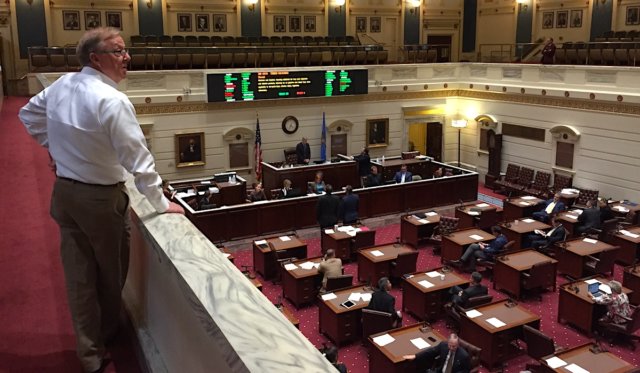
In an unexpected turn of events, the Oklahoma State Senate passed a bipartisan grand revenue bargain this afternoon that includes a hike in the gross production tax incentive rate from 2 to 4 percent. The bill passed 37 to 5, achieving the necessary three-fourths majority for revenue-raising measures.
The Senate convened shortly after 4 p.m. Monday to take up HB 1035, which they amended in a manner to make it like HB 1034, the “grand bargain” revenue bill featuring GPT that stalled in a House committee in late October.
House GOP leaders have spent the past few days putting public pressure on the Senate to hear a set of bills allocating $83 million in carryover money to the three agencies most affected by the $215 million budget hole that caused special session: The Oklahoma Department of Mental Health and Substance Abuse Services, the Oklahoma Health Care Authority and the Oklahoma Department of Human Services.
The amended bill in the Senate includes the following revenue provisions:
- a $1.50 tax on cigarettes
- modifications to tax stamp rules on cigarettes
- tax rate modification on “little cigars”
- a new tax on chewing tobacco, smokeless tobacco and snuff
- a $0.06 increase on the gas and diesel tax
- and a change to the taxation of low-point beer
- an increase in the gross production tax incentive rate from 2 percent to 4 percent
The revenue bill had been the trigger necessary for a $3,000 teacher pay raise, a $1,000 public employee pay raise and the restoration of the earned income tax credit’s refundability.
“If we can pass this revenue package and the House can pass this revenue package, then we will pass those three measures also,” said Sen. Kim David (R-Wagoner).
Senate Democratic Minority Leader John Sparks (D-Norman) expressed his support.
“I will be voting yes today because this is the (best) option put before me,” Sparks said. “The only other option I’ve heard out here is to default to the cash and cuts option.”
Sparks noted that, earlier Monday, Moody’s Investment Service announced a negative outlook on Oklahoma’s credit.
RELATED:
Senator perspectives
‘Short-term Band Aid’: House sends ‘legacy wells’ bill to Senate by William W. Savage III
After his debate, Senate President Pro Tempore Mike Schulz (R-Altus) told members that the bill would be one of the toughest votes they ever take while elected.
“You’ve seen me speak very rarely on this floor. I’m not going to stand before you today and pretend this is an easy vote for anybody in this chamber,” Schulz said. “We’re at a situation right now that I hope you take a little time to ponder and reflect upon because this is a historic moment in this state’s history. We have a decision before us to put us on a path forward or a decision before us for more of the same.”
Schulz said Monday’s vote would give senators a chance to represent their districts.
“Members, we have been extremely frustrated for the five or six weeks that we’ve been in special session, and frustrated before months before that,” Schulz said. “We have been frustrated that we have not been able to put a vote on the board to be statesmen, to be leaders and to put this state on the right path.
“My hope is that when we do this, we will show the way to the chamber across the rotunda to do the same.”
Monday’s action by the Senate will put pressure back on the House to hear the revenue package, which House Democrats tried to bring back to the floor last week, despite a majority of them voting against the measure in the aforementioned House committee.
Senators suspended “joint” rules between the House and Senate before voting, meaning they were able to amend a House bill that had passed, even though it had not received three-fourths majority in the House for a revenue measure.
Schulz: GPT at 4 percent ‘still gives them incentive to drill’
Schulz and other senators spoke at a press conference after the vote, with David saying the proposal is estimated to raise $132 million for the current fiscal hole but will raise upwards of $426 million in fiscal year 2019.
Schulz answered a question about what the oil and gas industry has said about the inclusion of a GPT hike.
“The one message we’ve heard out of the oil and gas industry consistently is that they are all over the board on GPT and what they think we need to do,” Schulz said. “I think that has more to do with that company’s current structure than anything else.
“Raising it from 2 to 4 percent still gives them incentive to drill, which is what that rate is supposed to be — an incentive to punch those holes in the ground, to continue to move Oklahoma’s economy forward, to employ Oklahomans both at the drilling site and in staging that well. Leaving that at 4 percent still gives that incentive, but I anticipate that we will still continue to hear support and opposition coming from the industry.”
Speaking after Schulz and other senators, Gov. Mary Fallin expressed hoped that the House would put the bill up for a vote to “show the public we are willing to address the tough issues (and) cast tough votes.”
Fallin said the bill’s passage would allow raises for teachers and state employees, and she discussed the inclusion of the gross production tax change.
“It has been said many, many times by the Democrat Party that unless they got a vote on GPT they wouldn’t vote for anything. So far, after five weeks, that is what has happened,” Fallin said. “So today, the Senate, along with the Democrat leader in the Senate and Republican leadership, put a vote up on the board, passed it, sent it as a live round to the House to let them vote on an increase in the GPT.”
The governor noted an attempt to balance the state’s revenue needs with the industry’s benefit.
“Now, we don’t want to do anything that is going to hurt the oil industry in our state. It provides one in seven jobs in Oklahoma’s economy. We know that even the rig count has been down a little bit this past week in the state of Oklahoma,” Fallin said. “But we also know we have some great, rich plays in our state — The SCOOP and The STACK. They are very exciting. We know that some new investment is coming into our state, so we need to be reasonable in what we do in Oklahoma. My goal is to find a path forward to end our legislative session. If this is what the House and Senate choose to do and if they send it to me as a live bill, I will sign it.”
Asked whether she believes rig count will decrease if the bill passes and GPT increases, Fallin said, “I hope not.”
(Update: This story was updated at 5:55 p.m. to include quotes from Schulz and Fallin.)






















